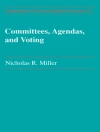This book is the first study on the work of the Eurogroup – monthly informal meetings between euro area finance ministers, the Commission and the European Central Bank. Puetter convincingly demonstrates how this small, secretive circle of senior decision-makers shapes European economic governance through a routinised informal policy dialogue. Although the role of the Eurogroup has been contested since before the group’s creation, its actual operation has never been subject to systematic evaluation. This book opens the doors of the meeting room and shows how an understanding of the interplay of formal provisions and informal processes is pivotal to the analysis of euro area governance.
The book advances the conceptual understanding of informal negotiations among senior European and national decision-makers, and provides a unique in-depth analysis of historical episodes of policy coordination. As other areas of European decision-making rely increasingly on informal, voluntary policy coordination amongst member states, the Eurogroup model can be seen as a template for other policy areas.
Tabella dei contenuti
Introduction
1. Theorising informality
2. Why does EMU require informal governance
3. The informal working method
4. The agenda
5. Informal governance and the operation of the SGP
6. Assessing the Eurogroup’s informal working method
7. Conclusion
Circa l’autore
Simon Bulmer is Professor of European Politics at the University of Sheffield












